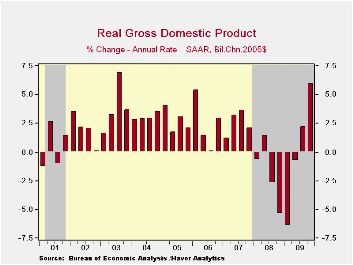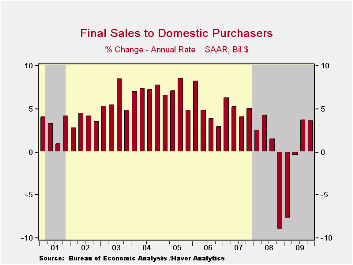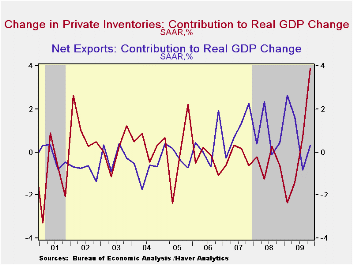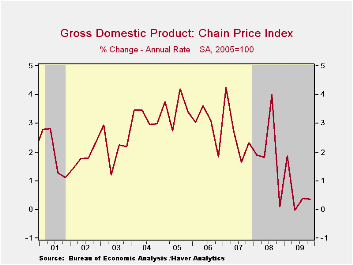 Global| Feb 26 2010
Global| Feb 26 2010U.S. GDP 4Q Increase Made Stronger By Inventories
by:Tom Moeller
|in:Economy in Brief
Summary
Rebuilding of depleted inventories was more of a factor behind improvement in 4Q economic than previously estimated. The result brought 4Q real GDP growth up to 5.9% (AR) from the advance estimate of 5.7%. Last quarter's growth was [...]

Rebuilding of depleted inventories was more of a factor behind improvement in 4Q economic than previously estimated. The result brought 4Q real GDP growth up to 5.9% (AR) from the advance estimate of 5.7%. Last quarter's growth was the strongest since 3Q 2003 and it raised the y/y change into (slightly) positive territory for the first time since early-2008. The revision slightly exceeded Consensus expectations for 5.7% growth.
 Voluntary inventory accumulation now is estimated to have
added 3.9 percentage points to economic growth last quarter. It was
necessitated by vigorous and unprecedented decumulation dating back to
2005. Likely prompted by price deflation and poor demand, decumulation
had reduced desired inventory levels too far.
Voluntary inventory accumulation now is estimated to have
added 3.9 percentage points to economic growth last quarter. It was
necessitated by vigorous and unprecedented decumulation dating back to
2005. Likely prompted by price deflation and poor demand, decumulation
had reduced desired inventory levels too far.
Improvement in the foreign trade deficit contributed slightly less to growth than the previously estimated one-half percentage point. An upwardly revised 22.4% (-0.8% y/y) rise in exports followed a 17.8% 3Q gain as the lower value of the dollar continued to improve the competitiveness of U.S. products. That revision was offset, however, by a larger upward revision to growth in real imports to 15.3% (-6.7% y/y).
Growth in domestic final demand was left roughly unchanged at a moderate 1.6% after a 2.3% 3Q increase. These gains remain the first back-to-back quarterly increases since 2007. Business investment in equipment & software led last quarter's growth with an 18.2% (-7.7% y/y) increase after its 1.5% 3Q rise. Investment in business construction, however, offset much of this increase with a 13.9% decline (-24.3% y/y). Residential investment remained strong with a little-revised 5.0% gain (-12.3% y/y) which was the second consecutive quarterly increase. Personal consumption growth lagged with a downwardly revised 1.7% (1.0% y/y) increase. Finally, quarterly spending by government fell slightly more than initially estimated (+1.3% y/y), mostly due to a drop in defense spending.
Price inflation was revised slightly downward to a 0.4% gain as measured by the chained GDP price index after little or no inflation during the prior two quarters. Diminished price gains for all of last year pulled the annual increase down to 1.2% which was nearly its weakest increase since the early 1960s. The personal consumption chain price index rose a lessened 2.3% in 4Q and increased just 0.2% for the whole year owing to the yearly decline in energy prices.
The U.S. National Income & Product Account data are available in Haver's USECON and the USNA databases.


| Chained 2005$, % AR | 4Q '09 Preliminary | 4Q '09 Advance | 3Q '09 | 2Q '09 | 4Q Y/Y | 2009 | 2008 | 2007 |
|---|---|---|---|---|---|---|---|---|
| GDP | 5.9 | 5.7 | 2.2 | -0.7 | 0.1 | -2.4 | 0.4 | 2.1 |
| Inventory Effect | 3.9 | 3.4 | 0.7 | -1.4 | 0.1 | -0.7 | -0.4 | -0.4 |
| Final Sales | 1.9 | 2.2 | 1.5 | 0.7 | -0.0 | -1.7 | 0.8 | 2.5 |
| Foreign Trade Effect | 0.3 | 0.5 | -0.8 | 1.7 | 0.9 | 1.0 | -1.2 | 0.8 |
| Domestic Final Demand | 1.6 | 1.7 | 2.3 | -0.9 | -0.9 | -2.7 | -0.4 | 1.7 |
| Chained GDP Price Index | 0.4 | 0.6 | 0.4 | -0.0 | 0.7 | 1.2 | 2.1 | 2.9 |
Tom Moeller
AuthorMore in Author Profile »Prior to joining Haver Analytics in 2000, Mr. Moeller worked as the Economist at Chancellor Capital Management from 1985 to 1999. There, he developed comprehensive economic forecasts and interpreted economic data for equity and fixed income portfolio managers. Also at Chancellor, Mr. Moeller worked as an equity analyst and was responsible for researching and rating companies in the economically sensitive automobile and housing industries for investment in Chancellor’s equity portfolio. Prior to joining Chancellor, Mr. Moeller was an Economist at Citibank from 1979 to 1984. He also analyzed pricing behavior in the metals industry for the Council on Wage and Price Stability in Washington, D.C. In 1999, Mr. Moeller received the award for most accurate forecast from the Forecasters' Club of New York. From 1990 to 1992 he was President of the New York Association for Business Economists. Mr. Moeller earned an M.B.A. in Finance from Fordham University, where he graduated in 1987. He holds a Bachelor of Arts in Economics from George Washington University.
More Economy in Brief
 Global| Feb 05 2026
Global| Feb 05 2026Charts of the Week: Balanced Policy, Resilient Data and AI Narratives
by:Andrew Cates






